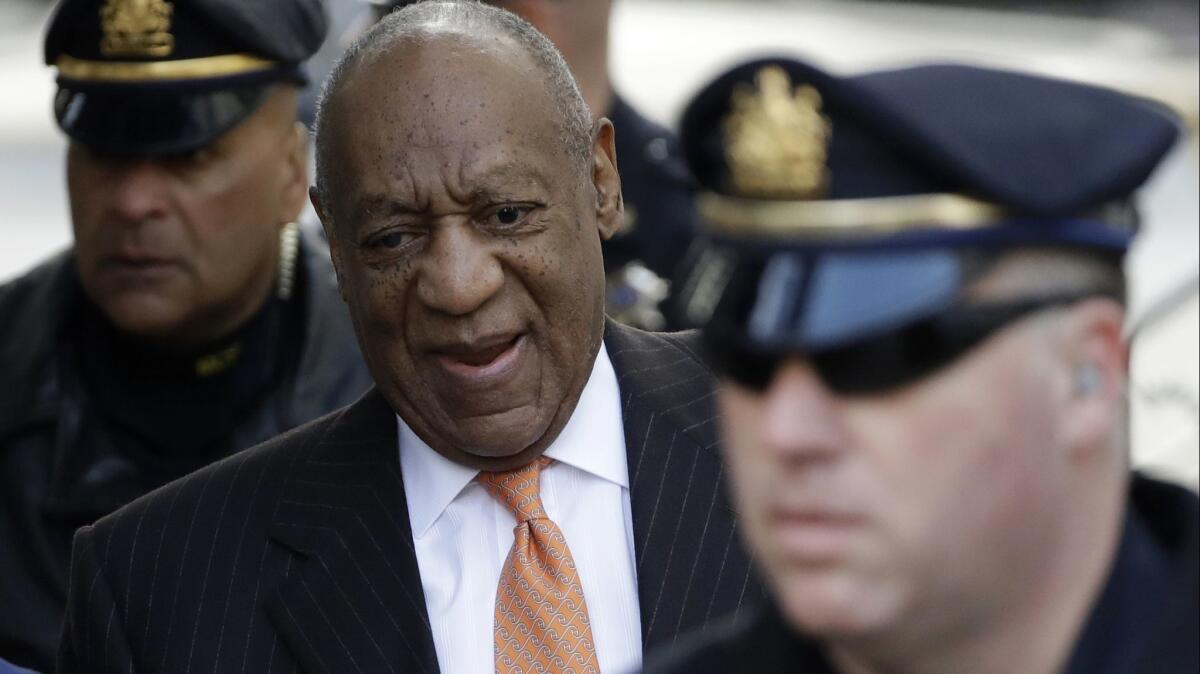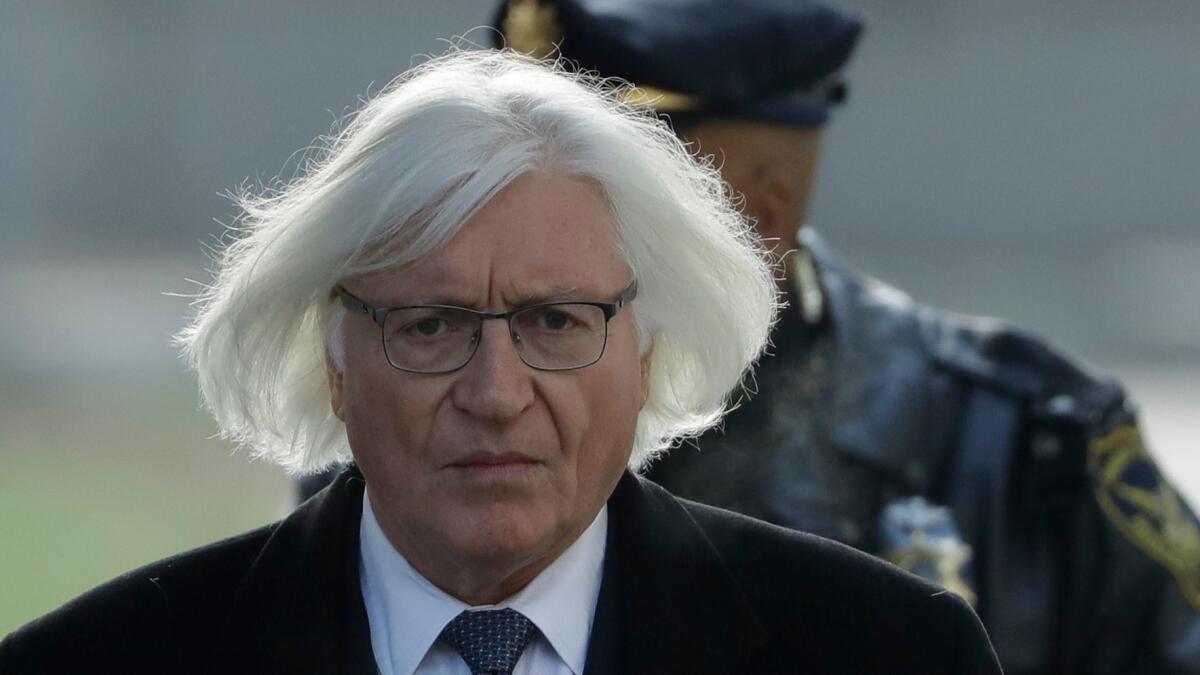Flying in the face of the #MeToo movement, Cosby’s attorney slams accuser as ‘con artist’

- Share via
Reporting from Norristown, Pa. — Bill Cosby’s lead attorney launched a blistering attack Tuesday on the character and credibility of the former Temple University basketball staffer who has accused the comedian of drugging and sexually assaulting her, calling Andrea Constand a “con artist” who “hit the jackpot” with an earlier $3.8-million civil settlement against him.
“Watch who this person Constand really is,” Tom Mesereau, the high-powered Los Angeles attorney who heads Cosby’s legal team, told the jury in his no-holds-barred opening statement at Cosby’s retrial in suburban Philadelphia.
He painted the 44-year-old accuser as an opportunistic schemer who had calculatedly pursued Cosby, now 80, as a financial target, concocting a “so-called drugging and assault that never happened.”
“A con artist, ladies and gentlemen of the jury,” Mesereau said, repeating: “A con artist.”
It was a risky courtroom gambit — especially coming just hours before a Colorado music teacher described an eerily similar assault by the comic in 1984, when he was a charismatic star and she was an aspiring musical-theater actress.
The retrial that got underway on Monday centers on an encounter 14 years ago between Cosby and Constand, which the defense claims was consensual sexual activity between the two. Constand says the comedian manipulated her into taking pills that incapacitated her, then groped her breasts and penetrated her digitally.
Cosby was 66 at the time; she was 30.
The combative rhetoric employed by Mesereau seemed to fly in the face of national sentiment surrounding the #MeToo movement, which has seen the toppling of powerful and prominent men over accusations of sexual misconduct and triggered ongoing debate about holding those in authority accountable for their sexual misconduct, particularly in the workplace.
The legal drama unfolding in the Montgomery County Courthouse is the highest-profile celebrity trial since the movement ignited last fall when a parade of well-known actresses and others came forward with stories of serially predatory behavior by movie mogul Harvey Weinstein.
Mesereau seemingly sought to turn that believe-the-accuser zeitgeist on its head, suggesting that “the current climate in America” — an apparent reference to the #MeToo movement — could make it harder for the comedian to get a fair hearing. And he scoffed at the notion that Constand had come forward out of principle.
“The only principle was money,” he said. “Money, money, money.”

The harsh tone of Mesereau’s statement signaled a likely effort to attack the credibility not only of Constand, but of other women who have come forward to accuse Cosby of a similar pattern of predatory behavior. The defense attorney derided in advance the expected accounts of assaults like the one Constand described as “prosecution by distraction.”
In Cosby’s first trial, which ended last June with a deadlocked jury, only one other woman besides Constand was permitted to testify about Cosby’s alleged misconduct. This time, up to five others are expected to take the stand, out of 19 women whose testimony the prosecution sought to introduce.
They in turn are among dozens of women who have come forward and alleged drugging and groping by Cosby, but many of the alleged incidents date back decades and the statute of limitations has expired.
The first of those women took the stand Tuesday afternoon, offering a composed but gripping account of an encounter with the entertainer after he offered to mentor her.
Heidi Thomas, a long-married mother of three from Castle Rock, Colo., said she was introduced to Cosby by her agent in 1984, when she was in her early 20s and working as an actress at a dinner-theater playhouse in Denver. Her agent said Cosby had offered to help out a promising young performing talent.
She testified that she was thrilled that a famous comic with Hollywood clout — a “giant in the industry,” she called him — was taking a professional interest in her. Thomas described herself as unsophisticated. “I was kind of ‘Rebecca of Sunnybrook Farm,’” she said, referring to the wholesome heroine of the popular series of children’s books.
After Cosby called her at home and spoke to her parents, she accepted an agency-paid trip to Reno for what was to be an acting-coaching session with the comic, who was performing at a casino there. She was booked at a hotel, but a driver met her at the airport and drove her to a ranch house outside Reno, telling her that Cosby liked to spend time there untroubled by paparazzi.
She testified that she found herself alone with him in the house, which surprised her. Cosby asked her to do a “cold read” of a scene in which she played a character who was intoxicated, and he seemed disappointed with her performance. He produced a glass of white wine and told her to sip it as a “prop,” which she said she did.
What she recalled next was disjointed and fragmentary, she said, likening the sensation to viewing a series of snapshots.
“I remember waking on a bed. I had clothes on, he did not. I was lying down and he was forcing himself in my mouth,” she said. “I remember thinking — I felt sick, and ‘How did I get here?’’’
She said she recalled nothing of her trip home, but was convinced that she must have somehow blunderingly given Cosby the impression that she was willing to engage in sex acts. “I must have said something that was misunderstood, and I really wanted to fix it,” she said she remembered thinking.
Her story was a jarring contrast to the morning’s opening statement by Mesereau, a flamboyant figure with flowing white hair, who began his opening statement by previewing the expected testimony of Marguerite Jackson, who years ago was a sometime roommate of Constand on the road with the Temple basketball team.
Jackson, he said, would detail a damning conversation in which Constand mused about falsely accusing a powerful man of sexual assault in order to seek a big payout.
“‘Were you really assaulted?’” Mesereau said Jackson asked her then. “‘No, but I can say I was, and set up a celebrity, and get a lot of money for my education and my business,’” Jackson said Constand replied, according to the defense.
Later, when Jackson heard on the news that Constand had publicly accused Cosby, “her reaction was, ‘Oh, my God, she did it,’” Mesereau told the jury.
Judge Steven O’Neill repeatedly broke in to remind the jury that opening statements by the prosecution and the defense are not to be treated as evidence, but merely their assertions about what they would try to prove. Cosby faces three counts of aggravated assault.
Mesereau, who is best known for representing singer Michael Jackson on child molestation charges, sought to portray Cosby as a sympathetic character for whom the trial and retrial represented a punishing ordeal.
“It’s brutal for him,” he said. “He’s 80 years old and legally blind.” Nonetheless, he said, Cosby welcomed a chance to vindicate himself.
Hollywood is a treacherous place.
— Tom Mesereau, Bill Cosby’s attorney
In his statement, Mesereau also set forth a broader indictment of the entertainment world in which a young Cosby rose from humble beginnings to become a talented and trailblazing performer.
“Hollywood is a treacherous place,” he said. “If you’re a young star, everyone wants a piece of the action.”
In his opening statement on Monday, Dist. Atty. Kevin Steele had sought to sum up Cosby’s behavior toward Constand on the night in question, telling the jury: “This case is about betrayal.”
“Betrayal?” Mesereau said mockingly in response on Tuesday. “Does it sound like Bill Cosby betrayed her? … Or did she try to use him and milk him for over $3 million?”
A day earlier, Steele told the jury that Cosby had paid $3.38 million in the 2006 civil settlement, which until now had been confidential. That disclosure was apparently meant to undercut the defense’s portrayal of Constand as motivated by greed, with Steele saying it instead showed Cosby wanted to hide his behavior.
Mesereau dismissed the payment as an effort to dispose of a false “nuisance” claim, describing it as a paltry sum for the wealthy entertainer.
Testimony began Tuesday with expert witness Barbara Ziv, a forensic psychiatrist, in an apparent effort by the prosecution to counter the defense’s campaign to portray Constand as a deliberate liar over conflicting statements to police and to depict her as calling and visiting Cosby many times after the alleged assault.
Ziv said it was not unusual for sexual assault victims to continue to have contact with the person who attacked them, particularly if the assailant is in a position of power relative to them.
Security for Tuesday’s session was tightened. Outside the courthouse on Monday, a bare-breasted female protester leaped over a police barricade and ran in front of Cosby. He appeared startled but was physically unscathed. On Tuesday, double barricades were in place and five sheriff’s deputies, along with a lawyer and publicist, accompanied him on the short walk into the courthouse.
UPDATES:
4:50 p.m.: The article was updated with testimony from Heidi Thomas.
The article was originally published at 9:45 a.m.
More to Read
Sign up for Essential California
The most important California stories and recommendations in your inbox every morning.
You may occasionally receive promotional content from the Los Angeles Times.












